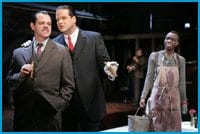Bertol Brecht and Kurt Weill’s The Threepenny Opera is one of the best-loved pieces of musical theatre from the 20th century. Set in the seedy underbelly of Victorian London, the show brings us into a world of starving beggars, conniving hookers and ruthless criminals.
Mr and Mrs Peachum (played by William Webster and Nancy Palk in the new Soulpepper production) run the city’s begging racket by outfitting the poor with artificial limbs and other costumes to stimulate greater pity (and greater donations from the passersby). They learn that their only daughter Polly (Patricia O’Callaghan) has been seduced by the greatest thug in town, MacHeath, aka Mack The Knife (Soulpepper artistic director Albert Schultz). When Polly refuses to leave him, the Peachums set out to have MacHeath arrested, though this is complicated by the fact that he’s an old friend of Tiger Brown the chief of police (Stuart Hughes).
The musical should be a dark and sexy look at class, poverty and violence that caused considerable controversy when it premiered in Berlin in 1928. The Threepenny Opera is Soulpepper’s first kick at the musical can and it’s a gutsy choice. The show can almost ride on the strength of its musical numbers, assuming a cast of strong voices. Unfortunately, this is not a company of singers. The production suffers as a result and though the live band is strong, it occasionally drowns out the singers.
The addition of the Soulpepper Academy students to the cast is a nice gesture, but the show would have played better with real singers. We have plenty of great musical theatre performers in this city, and it’s a shame that the company didn’t give more of them a chance in this production.
Schultz is woefully miscast as the bloodthirsty killer MacHeath, (think Kelsey Grammer trying to play Hannibal Lecter). There’s nothing scary (nor sexy) about him and he’s completely unbelievable as the object of Polly’s affection and of everyone else’s fear.
O’Callaghan is fine as Polly and has one of the better voices in the production, though she displays virtually no chemistry with Schultz.
The standout of the show is d’bi.young.anitafrika as the Ballad Singer. She is the only actor playing in a non-naturalistic style. Though her performance feels closer to the intention of the script, she seems out of place in the piece with everyone else on stage being so subdued.
Director Tim Albery and designer Lorenzo Savoini have made an intriguing choice by setting the piece in an abattoir. Though it’s in keeping with all the images of bloodshed and slaughter in the text, it’s not fully realized. The blood-spattered walls are barely visible with Bonnie Beecher’s lighting and, except for a side of beef that makes a brief appearance at the top of the show, the references to meat are kept to a minimum.
There are numerous English translations of this play and Albery has pieced together an interesting version. He’s focussed on issues of poverty and played down the sexuality and violence. I’m presuming this was done to accommodate the tastes of the Soul-pepper’s subscription audience, though judging by the heads nodding off in slumber in front of me, the production would have been better served with a text just slightly more titillating.


 Why you can trust Xtra
Why you can trust Xtra


